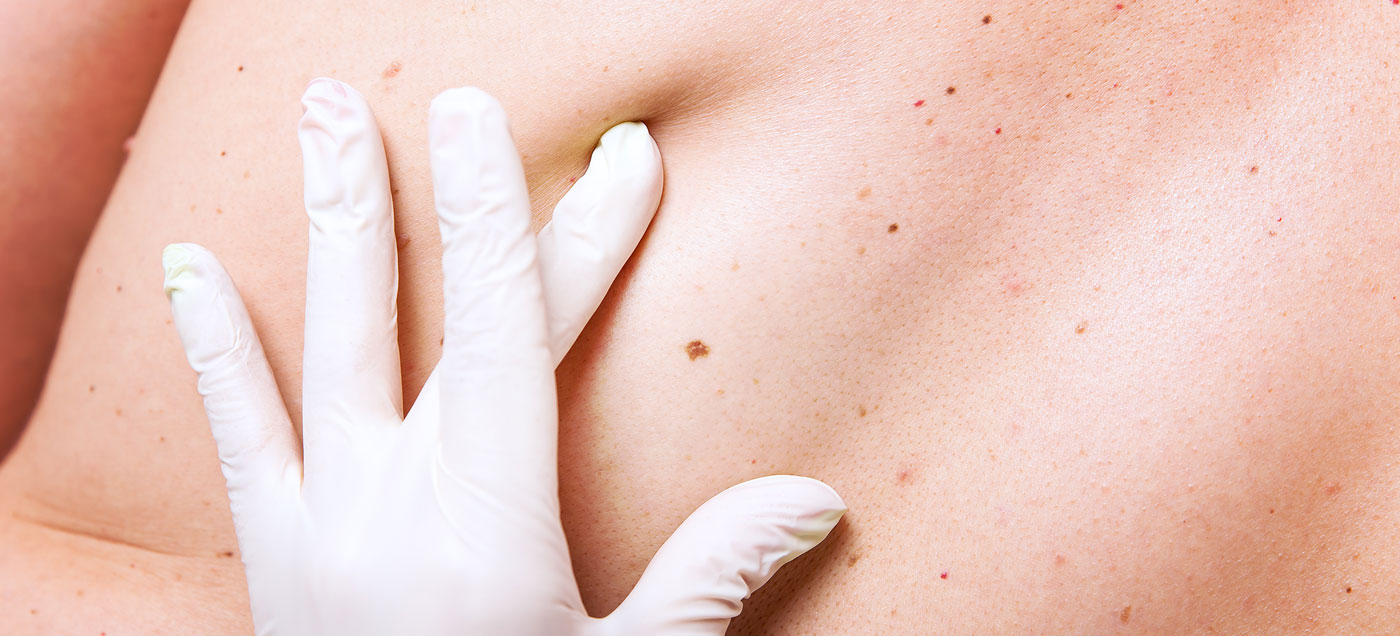
Doing the research
Learn More About Your Diagnosis
Wherever you are in this journey, we are here to help you process everything you need to know in a supportive and informative way.
Our team is made up of multiple cancer specialists, including oncologists, radiologists, surgeons and nurses. At Baptist MD Anderson Cancer Center in Jacksonville, Florida, we follow the same practices provided at MD Anderson Cancer Center.
We make it our job to continually research and understand every aspect of cancer so that we can gently guide you through your care.

What we look for
Diagnosing Skin Cancer
Skin cancer is the most common type of cancer, and occurs when cancer cells form in your skin tissue.
Skin cancer begins in the epidermis – the thin, outer layer of the skin. Your epidermis is made up of three kinds of cells:
- Squamous cells: Flat, thin cells that form the top layer of the epidermis
- Basal cells: Round cells beneath the squamous cells
- Melanocytes: Cells that make melanin, which is the pigment that gives skin its natural color – when skin is exposed to the sun, melanocytes make more pigment and cause the skin to darken.
Main Types of Skin Cancer
The main types of skin cancer are basal cell carcinoma, squamous cell carcinoma and melanoma. Skin color and sun exposure can increase your risk of basal cell carcinoma and squamous cell carcinoma.
Basal cell carcinoma and squamous cell carcinoma often appear as changes in the skin, such as open sores, red patches, pink growths or shiny bumps. Melanoma is less common than other skin cancer types, but more likely to spread to other parts of the body.
Recurrent melanoma is cancer that has recurred (come back) after it has been treated. The cancer may come back in the area where it first started or in other parts of the body, such as the lymph nodes, lungs or liver.
Actinic keratosis is a skin condition that commonly appears on the face and hands, and sometimes can turn into squamous cell carcinoma.
Signs of actinic keratosis include:
- Rough, scaly patches on the skin that are red or brown in color
- Cracking or peeling of the lower lip that is not helped by lip balm or petroleum jelly

What to expect when diagnosing skin cancer
If your primary care doctor or dermatologist suspects that you have skin cancer, they will remove it or perform a biopsy, which involves taking a small sample of your skin to be examined at a laboratory.
If you are diagnosed with cancer, Baptist MD Anderson doctors can thoroughly explain the treatment options for your unique situation and help you decide on the best plan for you.
In addition, a nurse navigator with specialized training in skin cancer will be with you throughout your cancer journey to answer questions, help coordinate care, provide emotional support and guide you every step of the way.
Identifying
Skin Cancer Stages
Identifying the stage, or extent, of your cancer is critical to determining the best course of treatment for your situation.
During your diagnosis, tests are usually done to determine the specific stage of a skin cancer and to find out if cancer has spread within the skin to lymph nodes or to other parts of your body.
Common diagnostic
Tests & Procedures
Once you know the stage of your skin cancer, you and your doctor can use this information to decide on the best treatment plan for you. Tests and procedures that may be used in the skin cancer staging process include:
- Physical exam
- Chest X-ray
- Blood tests
- Ultrasound exam
- Removal of lymph nodes (sentinel lymph node biopsy)
- MRI
- PET scan
- CT scan

Getting the right diagnosis
Second Opinions
A second opinion can be a game-changer for patients. While it is rare for a diagnosis to change from malignant to benign, a second opinion may reveal other information. Our team verifies whether your staging is correct, your tumor size is correct and your overall assessment is correct. All of these factors can affect which treatment options you are offered.
Contact Us
If you have any questions, we have you covered. We have nurse navigators available to guide you through every step of your care. Request an appointment or speak to a nurse navigator by phone or online.

Our Location
Skin Cancer Clinic
Within our specialized, multidisciplinary clinics, we bring together our team of experts to care for your mind, body and spirit - all under one roof. Each of our clinics are singularly focused on your specific needs and treatment.
Need Directions? The skin cancer clinic is located at the Baptist MD Anderson Cancer Center.
Find a Doctor
Our care team brings medical oncologists, radiation oncologists, surgeons and other specialists together for each patient.
For whatever step is next,
Baptist MD Anderson is Here for You
Our team of experts are ready to help you navigate the whirlwind of emotions, options and decisions through every aspect of your care.
Prepare for your appointment
See everything you need to know before coming in.
Find a support service
Care for your mental, spiritual health, too.
Billing & insurance
Resources for insurance and financial questions.

The cancer experiences we’ve had are a testimony to our faith in God and a testimony to the treatments we received at Baptist MD Anderson Cancer Center.
— BOB DEBOER, skin cancer survivor
As the saying goes, "it takes a village" to properly treat someone with cancer. This saying was especially true for Bob and his wife Barbara.


